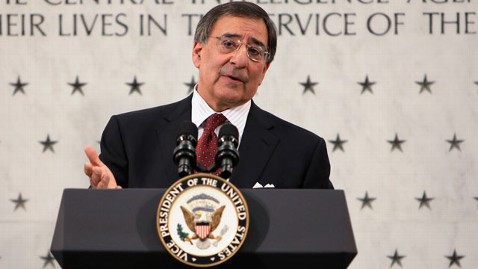Jan 11, 2013 6:00am

J. Scott Applewhite/AP
He may have paid a goodbye visit to Defense Secretary Leon Panetta last November,?but this week Israeli Defense Minister Ehud Barak was back at the Pentagon.
It turns out his visit?was part of an ongoing discussion with Syria?s neighbors about how to deal with Syria?s chemical weapons ? how to secure them, how to make sure they don?t ?wind up in the wrong hands? as Defense Secretary Leon Panetta told reporters today ? ?if the regime of President Bashar al-Assad should fall.? ?Syria is believed to possess one of the world?s largest stockpiles of chemical weapons, which are stored at dozens of sites throughout the country.
The violent rebellion against Syrian President Assad has raged for almost two years and the United Nations recently estimated that 60,000 Syrians may have died in the conflict.
In early December U.S. intelligence detected that the Assad regime had mixed precursors to Sarin nerve gas and loaded them onto some bombs at several Syrian airfields.? ?With concerns raised that they might be used by a desperate regime, the Obama administration issued strong warnings to Syria not to use its chemical weapons against its own people.
Panetta said Thursday that?the U.S. is ?not working on options that involve boots on the ground.?
But he added that ? you always have to keep the possibility that, if there is a peaceful transition and international organizations get involved, that they might ask for assistance in that situation.? But in a hostile situation, we?re not planning for that.?
The option to secure the sites, he added, depends a lot ?on ?what happens in a transition. Is there a permissive atmosphere? Or is it a hostile atmosphere??
Joint Chiefs Chairman Gen. Dempsey, joining Panetta for Thursday?s press conference, said,? ?We?re engaged in planning to develop options against alternative futures ? collaboration or cooperation, permissiveness, non-permissive, hostile, all of which would have different requirements.?? Dempsey said that training rebels was not one of those options.
Panetta said the ?greater concern? now ?about the Syrian stockpile is what steps the international community needs to do when Assad falls so ?that there is a process and a procedure to ensure that we get our hands on securing those sites? That, I think, is the bigger challenge right now.?
As part of the ongoing regional discussions Dempsey said he?d recently spoken with his Turkish, Israeli, Lebanese and Jordanian counterparts, with the intent of ?messaging? that those inside Syria responsible for any ?use of chemical weapons ? would be held accountable.?
Dempsey said preventing the Syrians from using their chemical weapons is ?almost unachievable? because U.S. intelligence would require constant surveillance ?to actually see it before it happened, and that?s unlikely, to be sure.?
However he added, ?I think that Syria must understand by now that the use of chemical weapons is unacceptable. And to that extent, it provides a deterrent value. But preventing it, if they decide to use it, I think we would be reacting.?
Interestingly Dempsey acknowledged that scientists have told U.S. officials that the Sarin the Syrians mixed in early December can only remain viable for 60 days. ?That?s what ? what the scientists tell us ?I?d still be reluctant to handle it myself,? said Dempsey.
?
?
Source: http://feeds.abcnews.com/click.phdo?i=c2450aebb66573ab601906c78482714c
masters live johan santana viktor bout ncaa hockey role models ferdinand porsche gregg williams
No comments:
Post a Comment
Note: Only a member of this blog may post a comment.